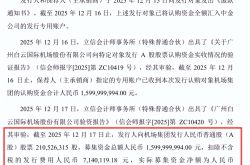The Great Collapse of Geyue: Spectators Abound, Deep Thinkers Scarce | The New Auto Decade
![]() 12/14 2024
12/14 2024
![]() 616
616
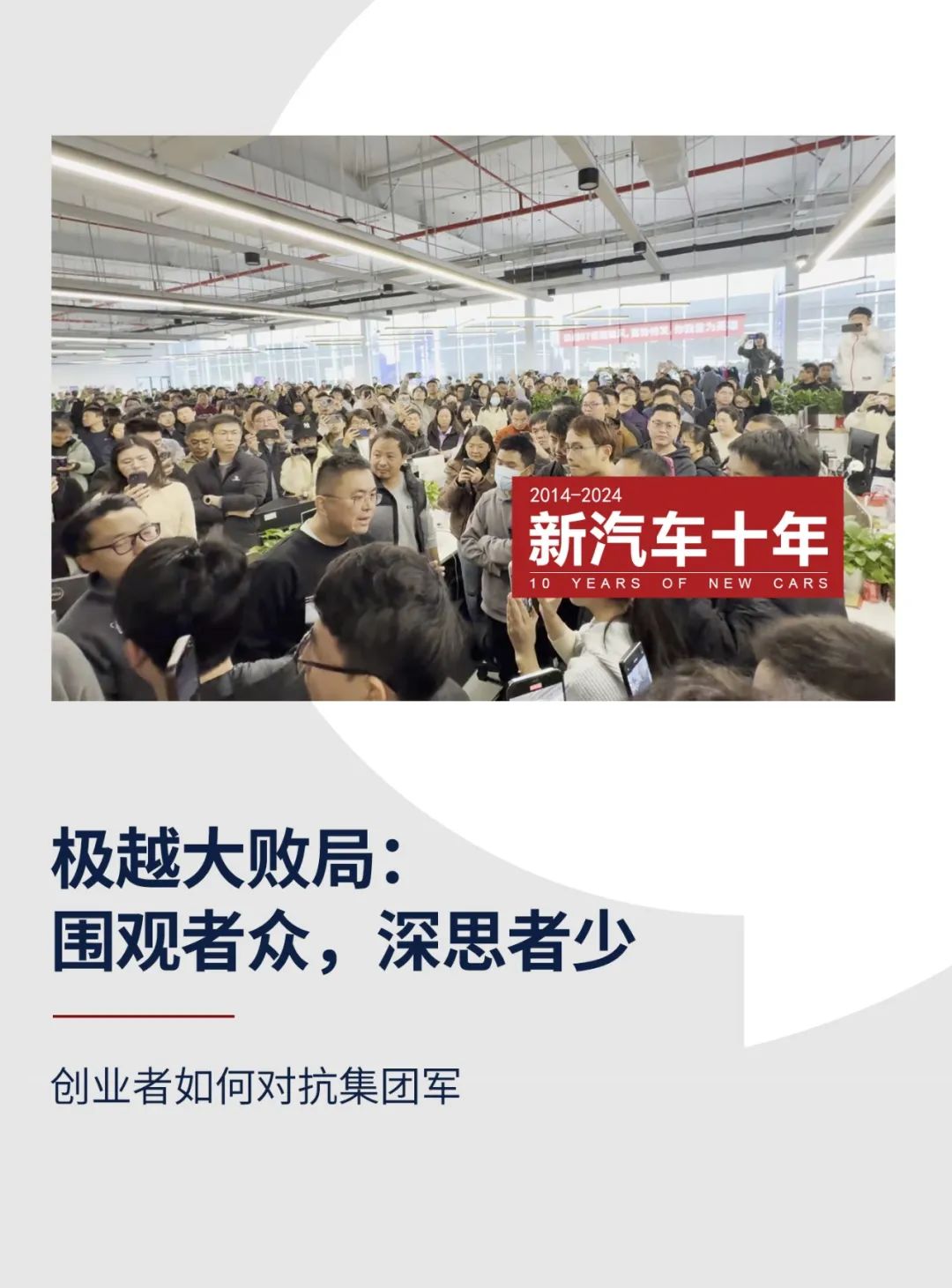
Author | Yang Lu
Editor | Li Guozheng
Produced by | Bangning Studio (gbngzs)
Employees swarmed into the CEO's office, demanding answers, suppliers clamored for payment online, and shareholders furiously withdrew their investments... A fledgling automaker garnered attention through these dramatic events, sounding the alarm for the burgeoning industry.
This is the harsh reality of the new automotive era.
On December 13, 2024, at 5:30 PM, Baidu Holdings and Geely Holdings jointly issued a statement addressing Geyue Auto's issues, outlining three main points:
1. Immediately resolve issues related to employee social security contributions and severance payments for departing employees.
2. Ensure the normal use, after-sales service, and maintenance of user vehicles.
3. Facilitate the legal and reasonable resolution of other matters.
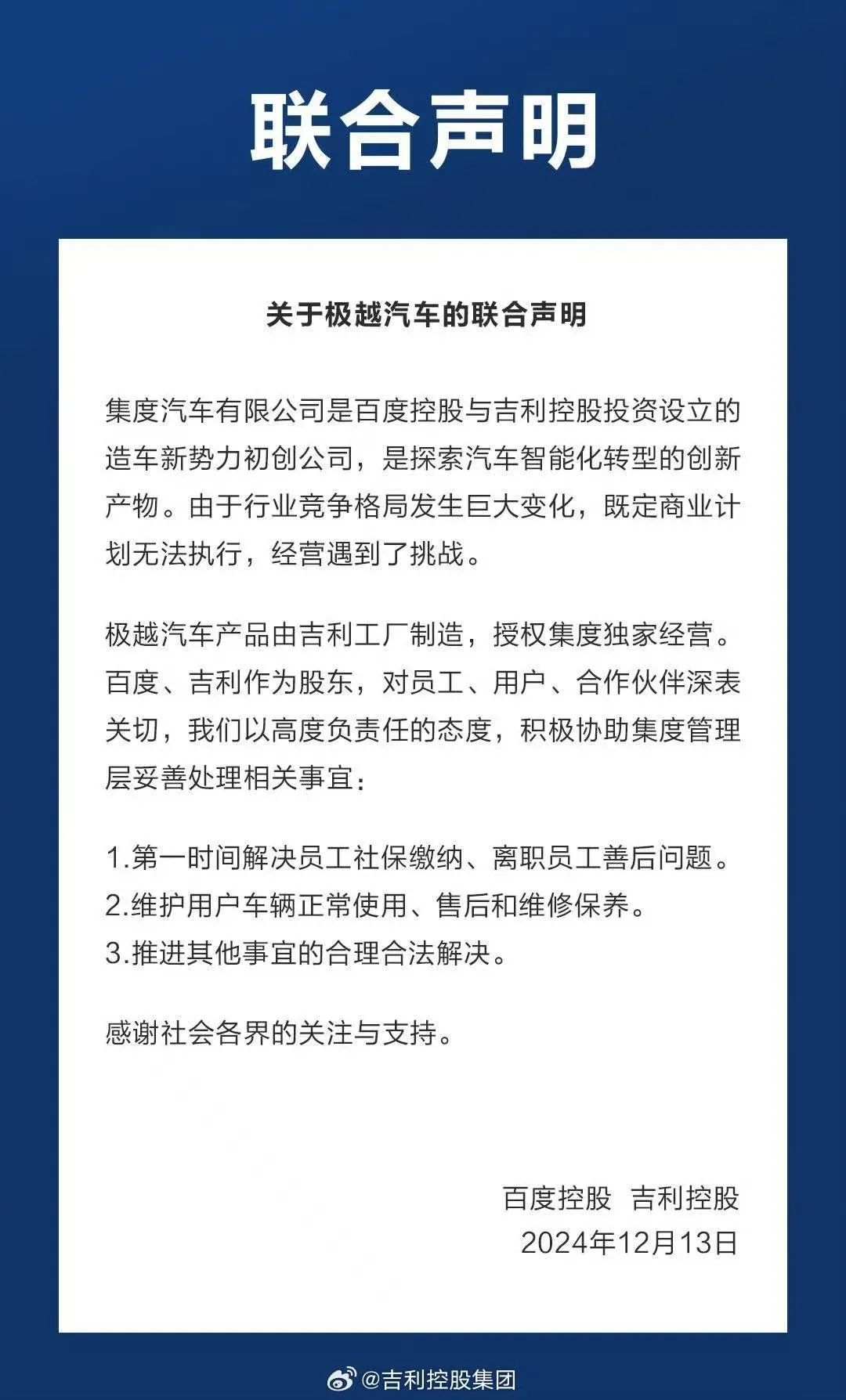
The Geyue farce began on the morning of December 12. "Why didn't you tell us in advance?" "Use your savings to pay our social security!" "No grandiose talk!" That day, Geyue's Shanghai headquarters saw employees besiege CEO Xia Yiping.
Videos circulating online showed nearly a hundred Geyue employees confronting Xia Yiping, many recording the scene on their phones. Surrounded and constantly interrupted, Xia eventually resorted to calling the police in frustration.
In the video, Xia Yiping stated, "I'm also working hard to solve the problem; otherwise, I wouldn't be here in the office today." When pressed by employees for a solution, he replied, "There's no solution yet; I'm just communicating with everyone..."
This "disturbance" stemmed from an internal meeting on December 11.
During the meeting, Xia Yiping acknowledged Geyue's difficulties and urged everyone to focus on core objectives to overcome them together. In an internal letter, he proposed four response measures: Firstly, continue long-term investment in core technology to maintain competitiveness; secondly, strengthen sales and service capabilities to compete in the fiercely competitive market; thirdly, merge duplicate departments and positions, reform inefficient internal workflows, and tap potential from internal management optimization; fourthly, cut projects that cannot improve financial performance in the short term to optimize resource allocation.
The internal letter, while seemingly motivating, read more like a sign of the company's impending disbandment.
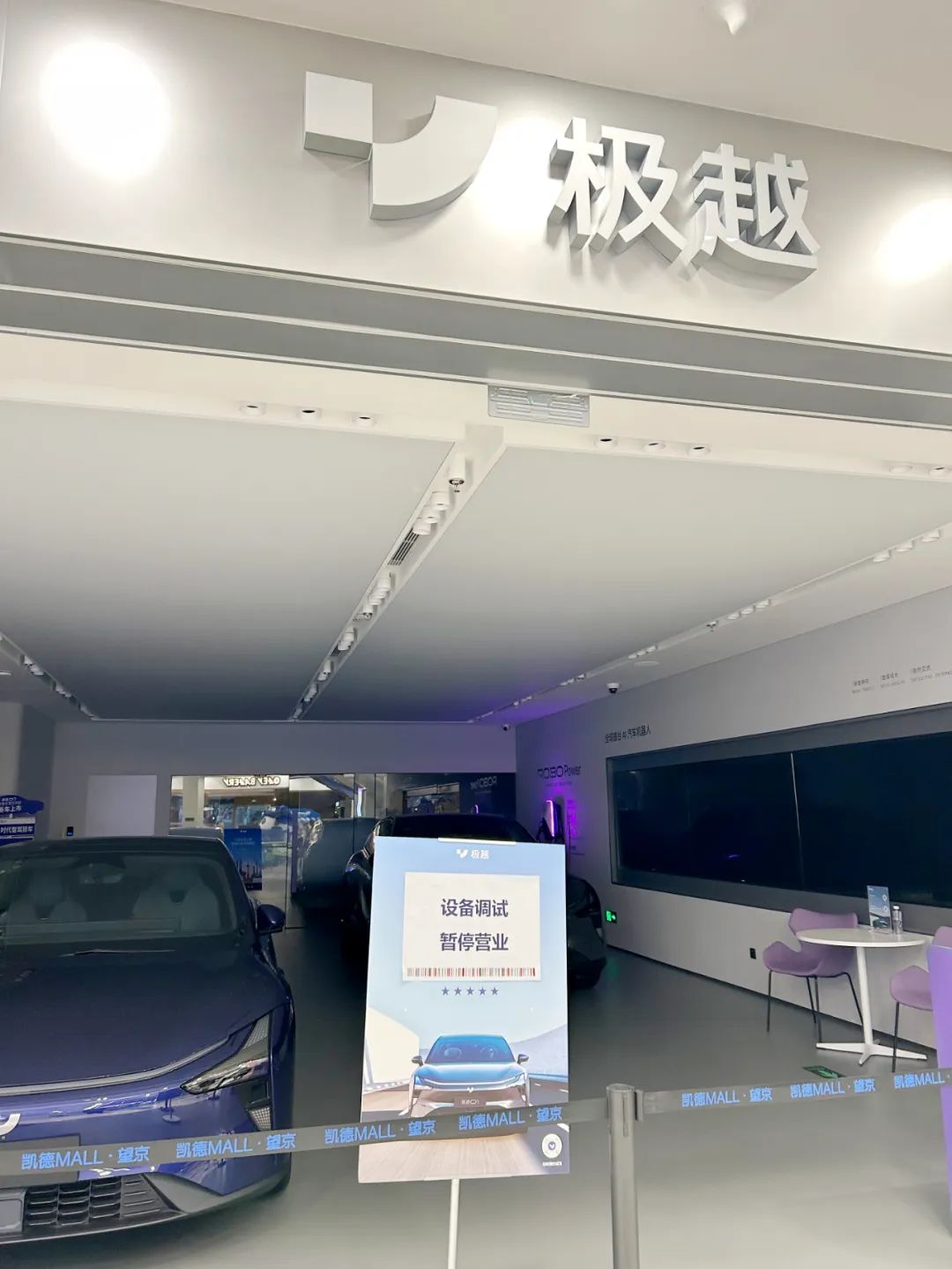
▲Geyue's store in Beijing's Kaide Mall, now closed
An employee revealed Geyue's proposed solutions for employee retention: Firstly, retain only 100 employees without paying salaries or social security; secondly, the sales center will commence vacations and await further notice; thirdly, stores will cease sales and no longer accept customers; fourthly, departing employees will receive N+1 compensation, but the payment date is to be determined. Employees' primary demands were for normal social security and salary payments, N+1 compensation for departing employees, and completion of the employee settlement process. During communications on the afternoon of December 12, Xia Yiping stated he would prioritize paying social security for over 800 employees in Beijing before addressing those in Wuhan and Shanghai due to regional deadline differences.
Faced with employees' siege and questioning, Xia Yiping emphasized, "I'm not a CEO who avoids problems. Geyue is something I built from scratch, like my child."
Bangning Studio repeatedly attempted to contact Xia Yiping for further clarification but was repeatedly rejected. Throughout December 12, Xia remained in the office communicating with employees. In the evening, employee representatives, Xia Yiping, and representatives from Geyue's two major shareholders—Geely and Baidu—held a late-night closed-door meeting to negotiate solutions to funding shortages and employee rights.
Company collapse, CEO besieged
News of Geyue's disbandment came abruptly. Despite rumors circulating for days that a Shanghai automaker would undergo significant layoffs, no one anticipated the severity, nearing the company's dissolution.
On December 11, a Geyue store live streamer received news of layoffs while streaming car sales. Initially skeptical, she broke down in tears on camera, mocking herself by saying, "All my hard work last month is gone now."
Xu Jiye, Geyue's head of public relations, posted on WeChat Moments, "The company is out of money and needs funding. To find funding, we need to stay afloat, so staying alive is paramount. Only by staying alive is there hope."
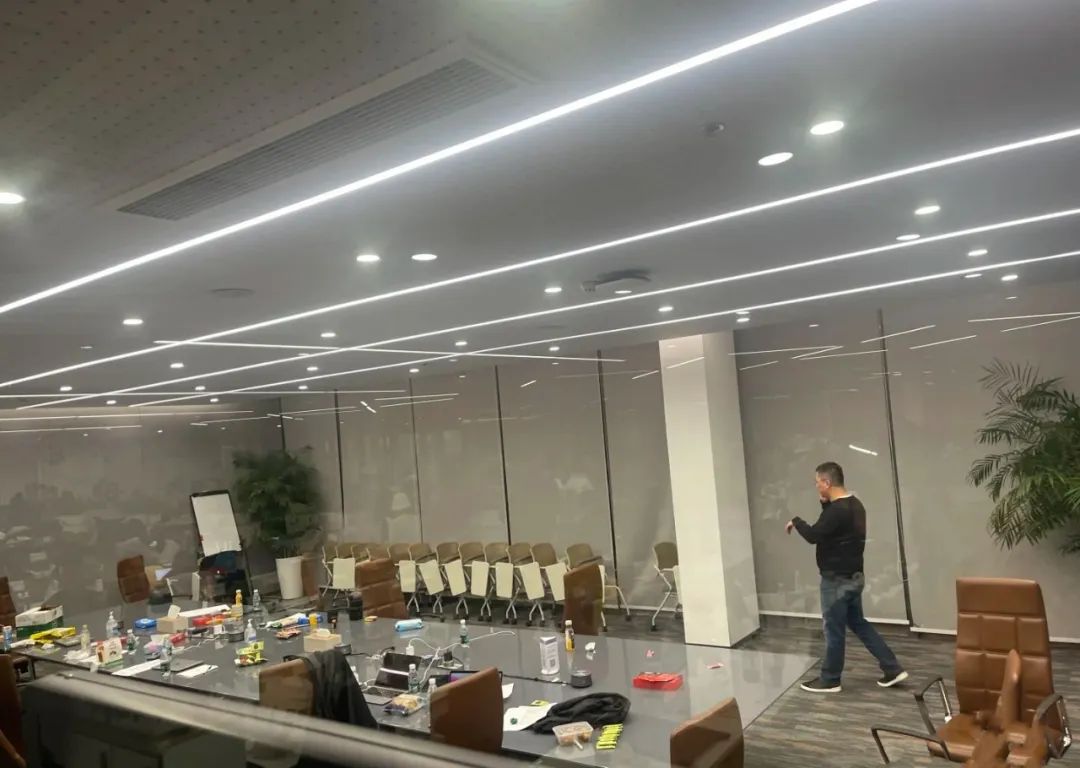
▲Image sourced from the internet
Why did Geyue suddenly run out of money?
Media reports cited insiders revealing that the primary reason for Geyue's sudden collapse was Baidu's withdrawal of investment. In October of this year, Baidu conducted a financial due diligence at Geyue in preparation for a subsequent 3 billion yuan investment, only to discover Geyue was financially troubled with a deficit of up to 7 billion yuan, prompting Baidu's decision to withdraw.
In response, Xia Yiping merely stated that Baidu had recently conducted a comprehensive audit of the company and found no issues.
Geely, the other major shareholder, is implementing a brand contraction plan and recently merged Lynk & Co. with Zeekr and integrated Geometry into Yinhe. With numerous subsidiaries and sub-brands, Geely barely has time to focus on Geyue, which sells around a thousand cars per month.
Despite endorsements from two giants, the lack of tangible financial support, coupled with poor performance and insufficient cash flow generation, naturally pushed Geyue to the brink. When discussing social security benefits with employees, Xia Yiping mentioned he was also negotiating with shareholders. When asked why shareholders withdrew their investment and stopped contributing to employee social security, Xia Yiping replied, "I also want to know."
He stated he was only a minority shareholder with decision-making power over business operations but not over the company's development, which required board decision-making, with 80% of the company's voting rights held by Baidu.
However, some employees viewed this as Xia Yiping exculpating himself.
Owed suppliers directly called out Geely and Baidu, stating in an online announcement, "If this matter is not properly resolved, it will not only directly affect the subsequent credit and cooperation foundation of the Geyue project but will also severely damage the reputations of the two parent companies in the public eye and industry."
"Consumers may doubt the integrity and responsibility of Baidu and Geely, and investors may also question the management capabilities and long-term value of the two companies. This will have an incalculable negative impact on the existing businesses and future business layouts of the two companies."
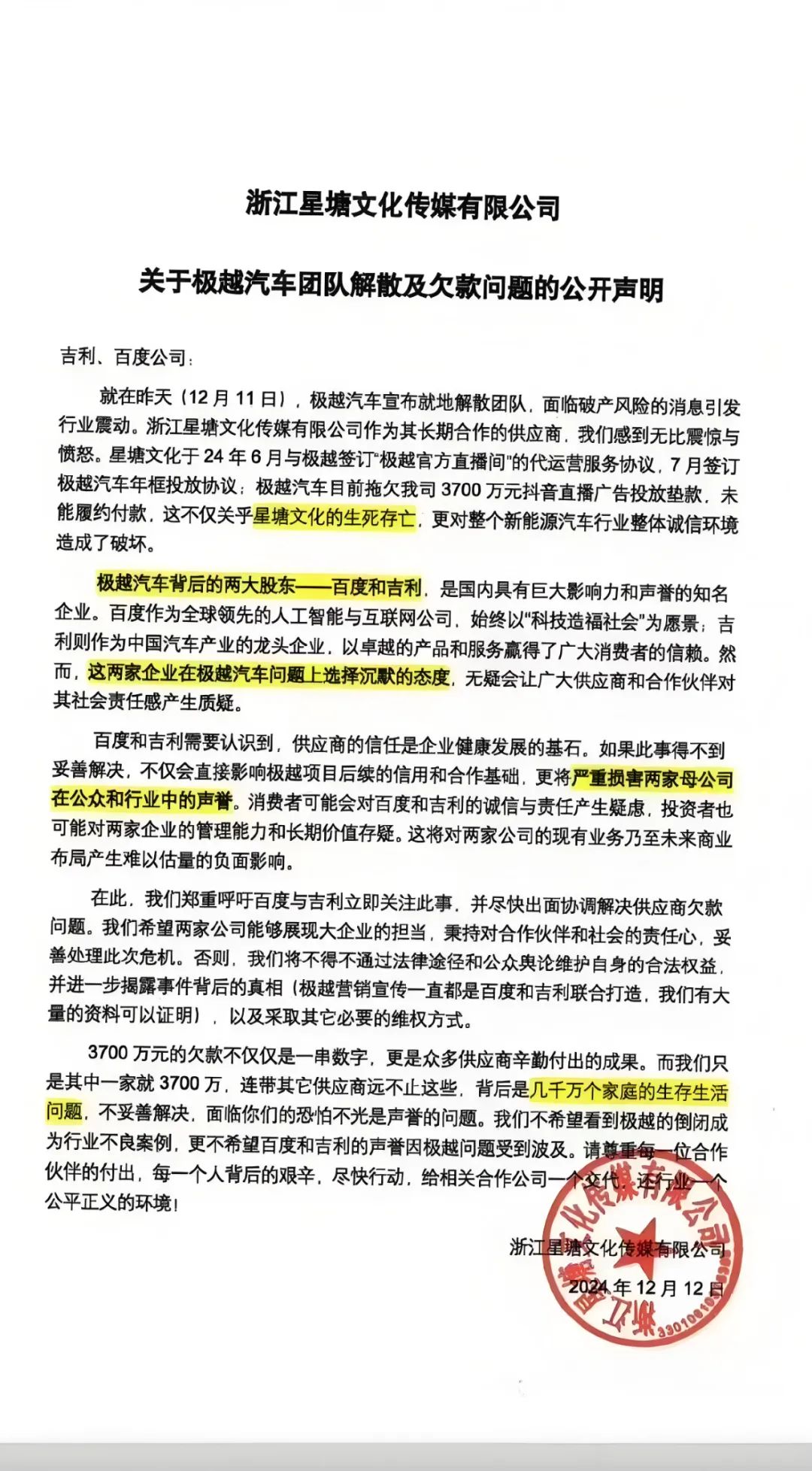
However, the effectiveness of such calls remains uncertain.
Netizens commented, "Geyue has had more news in the past two days than in the past two years combined."
Among the new automakers, Geyue has a unique positioning, focusing on the concept of "automotive robots" and claiming to be a leader in intelligence. However, this is merely self-proclaimed, as Geyue has made little impact in the new energy vehicle market due to poor sales. Many of its designs have been criticized as "anti-human design," but Geyue corrected this by saying it was "anti-consensus design," with Xia Yiping believing Geyue's designs were too ahead of their time.
This is somewhat similar to HiPhi Motors. When HiPhi products were first launched, features like gull-wing doors and rear-wheel steering were favored by some owners as showcasing cutting-edge and fashionable taste. However, the result was HiPhi's path towards collapse. It remains to be seen whether Geyue will follow suit, especially since Geyue's positioning is not ultra-luxury, and there are many competitors within its price range.
Currently, Geyue has two models: the sedan Geyue 07 and the SUV Geyue 01, priced from 186,900 yuan to 281,900 yuan. Data shows Geyue delivered 2,485 vehicles in November and a cumulative total of over 14,000 vehicles in the first 11 months, averaging less than 1,300 vehicles per month, making it virtually invisible among new automakers.
Geyue's development path has been tumultuous. Its predecessor, Jidu Auto, was jointly established by Baidu and Geely in 2021, with Baidu holding 55% and Geely holding 45%. Due to issues with vehicle manufacturing qualifications, the shareholding structure was changed, and the brand name was switched from Jidu to Geyue, with Baidu holding 35% and Geely holding 65%.
The shareholding structure determines the complexity of Geyue's operations, with the biggest controversy lying in corporate governance, especially regarding personnel. A former Geyue employee posted on social media that Xia Yiping was nepotistic and approved special projects for designated suppliers. A former employee told Bangning Studio that while online rumors may be exaggerated, they are not entirely baseless.
The Heavy Crown of the CEO
On the playing field, a coach who loses a game faces criticism and may even be fired. In business, when a company collapses, the CEO is often the target of scrutiny.
To wear the crown, one must bear its weight. This is Xia Yiping's reality.
On December 12, Xia Yiping appeared somewhat embarrassed during his conversations with employees in the office. He barely managed to say a complete sentence without being constantly interrupted by employees' questions.
Earlier this year, when HiPhi Motors halted production, CEO Ding Lei also appeared in the office. He first apologized to employees for strategic misjudgments and admitted that traditional business strategies couldn't compete with the internet. He told everyone HiPhi Motors had a maximum window of three months to turn things around and that he would actively strive for it.
However, the same situation turned into a farce at Geyue's office. Some employees believed the internal letter lacked sincerity, and the CEO, knowing about the funding shortage, did not inform everyone of the risks in advance. The proposed solution for employee layoffs was even more absurd.
Xia Yiping became the target of this storm.
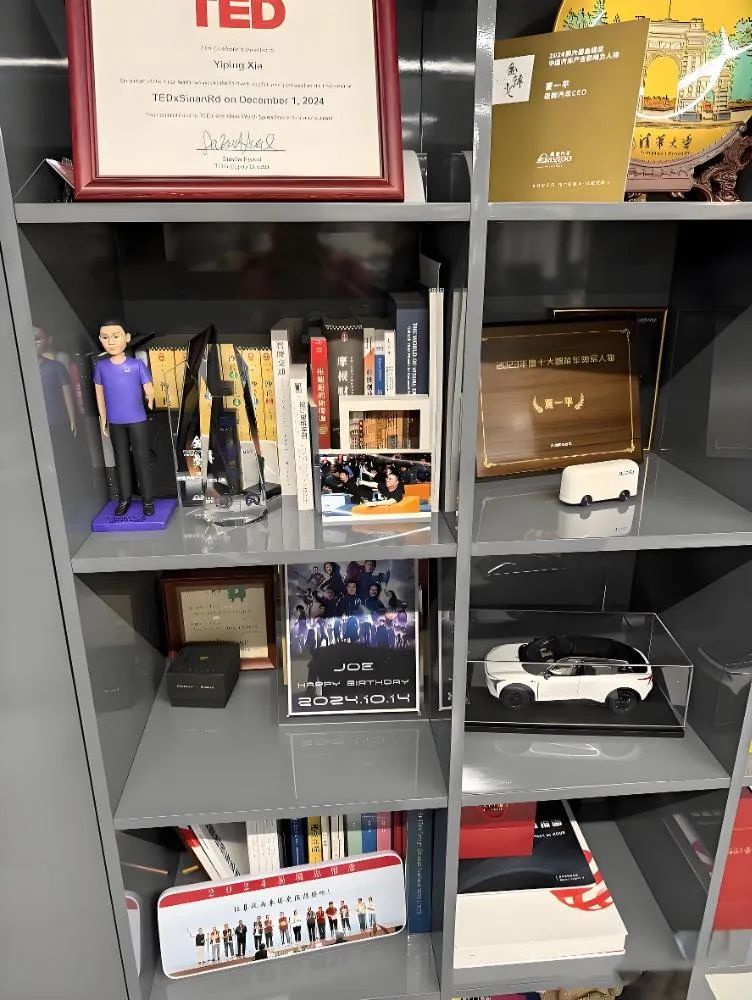
▲Xia Yiping's workspace bookshelf
When a company is on the decline, the CEO is invariably affected. Zhang Yong, the former CEO of NIO Auto, faced a similar situation to Xia Yiping's.
After NIO Auto struggled for over two months, Zhang Yong stepped down as CEO on December 6, 2024, with Fang Yunzhou, NIO Auto's founder and chairman, taking over concurrently.
On that day, Fang Yunzhou issued a letter to all employees stating, "NIO Auto, which has been in business for ten years, is standing at a crossroads of rebirth. Facing the extreme competition and rapid spread of public opinion in the market in recent years, coupled with a series of problems exposed in our strategy, organization, and management system, the company's development has encountered short-term turbulence."
Zhang Yong has been responsible for NIO Auto's operations since the brand's inception. Over the years, NIO Auto has experienced glorious moments, becoming the sales champion among new automakers in 2022 with 152,000 vehicles sold, leaving "NIO, XPeng, and Li Auto" behind. However, starting from 2023, NIO's sales began to decline, leading to news of layoffs, salary reductions, and limited funds by the end of 2023.
From January to September 2024, NIO Auto sold 86,000 vehicles, a year-on-year decrease of 12%, with sales figures for October and November not being released.
Earlier this year, Zhang Yong publicly reflected on social media, stating that NIO's transition between new and old products was not well-coordinated, that pricing strategies for new product launches were flawed, and that marketing efforts were inadequate. He personally took on the role of general manager of the marketing company.
At this time, Zhang Yong was under scrutiny from both the outside world and investors. Zhou Hongyi, the founder and chairman of 360, lambasted Zhang Yong during a live stream, saying, "You don't understand anything. Can't you learn from Xiaomi?"
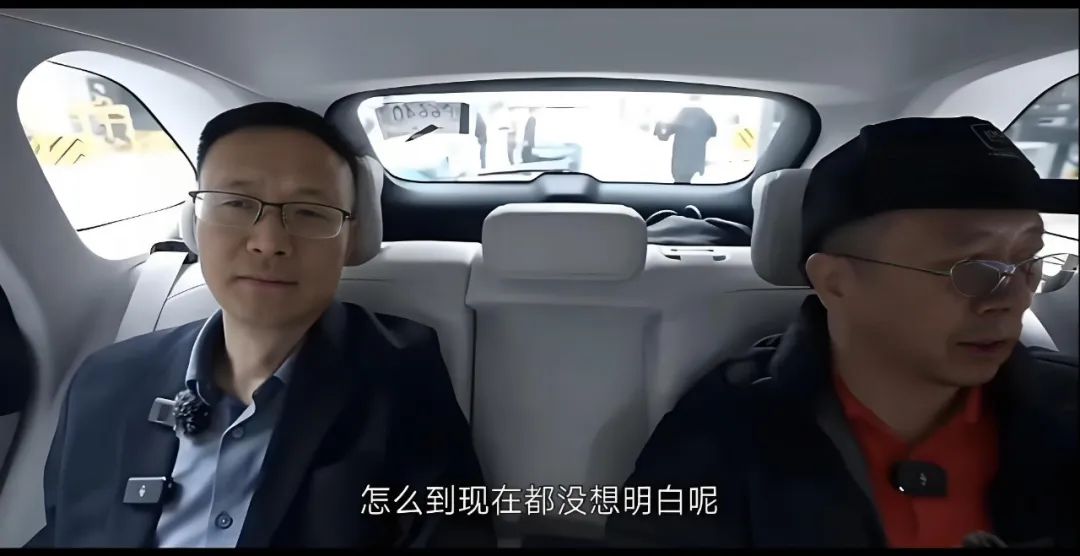
Mei Songlin, a senior automotive industry analyst, commented on NIO Auto, saying that only by returning to a technology-driven approach can the company be saved because a marketing-driven approach cannot rescue NIO, and a user-driven approach is not NIO's strength. "From developing good technology to implementing it and gaining user acceptance is a long process that must be endured. This process is like Sun Wukong enduring the torment of ice and fire in the Eight Trigrams Furnace. If he survives, he transforms and lives on," he said.
Both Xia Yiping and Zhang Yong are CEOs, not founders of their respective companies, but they bear the brunt when storms arise. During the December 12 communication, Xia Yiping smiled and shook his legs while talking to employees. In the eyes of employees, this showed an "indifferent" attitude, further fueling their anger.
In Geyue's office, someone shouted to confiscate Xia Yiping's passport, fearing he would flee. Xia Yiping responded, "Don't incite anymore."
Employees' fears regarding Xia Yiping's potential departure are not baseless. LeTV and Faraday Future (FF) founder Jia Yueting serve as poignant examples. Since boarding a flight to the United States in 2017, he has never returned to Chinese mainland soil.
From previous automotive newcomers like WM Motor, AITO, and HiPhi Motors to current players like NIO Auto and Geyue, the automotive landscape is undergoing another significant transformation, with some automakers perilously close to collapse.
Recently, Jishi Auto has been mired in controversy due to founder Chang Jing's cash-out activities. Chang Jing, who is also the chairman of another listed company, Roborock, recently cashed out nearly 900 million yuan from Roborock. This caused fluctuations in the company's stock price and sparked objections from investors, who questioned Chang Jing's commitment to Jishi Auto.
Jishi's monthly sales average only a few hundred vehicles, falling short of expectations. Some investors believe that Chang Jing is diverting resources away from his main business—robotic vacuum cleaners.
Amidst this wave of challenges, it remains uncertain whether automakers with poor sales will survive this difficult period.
Yang Yueqing, the former project engineering director of the HiPhi Motors project, advised Geyue employees in a livestream to sign resignation agreements promptly, avoid unrealistic expectations, and enter the job market without delay. Just like grocery shopping, the earlier you act, the more advantageous your position will be. The company might already be on the brink, and the likelihood of receiving compensation is uncertain.
Yang Yueqing also expressed concern about NIO Auto, stating, "If its sales do not achieve a significant breakthrough, its future is bleak. While HiPhi Motors has decent products, it too faces financial challenges."
Currently, the automotive market competition is intensifying, with large groups strategically consolidating. Capital is becoming more discerning towards new automotive entrants. Automakers with poor sales and marginal market positions are facing a broken funding chain and an existential crisis.
As early as 2022, Zhu Huarong, the chairman of Changan Automobile, predicted that only five or six automakers would ultimately survive in the Chinese market.
Huawei's Executive Director, Terminal BG Chairman, and Intelligent Automobile Solutions BU Chairman Yu Chengdong has also echoed this sentiment, stating that no more than five companies will ultimately thrive in the automotive sector.
In this turbulent industry, automakers' fortunes rise and fall, particularly for CEOs who must navigate funding issues while enduring criticism from employees and suppliers, carrying the stigma of corporate failure.
What is perplexing is the abundance of details about Geely EV's dissolution circulating on social media platforms. Many are eager to spectate, yet few take the time to deeply reflect or systematically analyze the underlying reasons behind Geely EV's plight and the warnings it poses for the industry.
What does Geely EV's experience reveal? A product manager from a new energy vehicle company told Boning Studio, "At this stage, only by adopting a hit-product model can startup teams compete effectively against large conglomerates."





